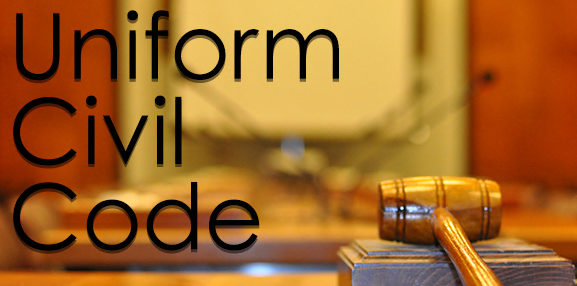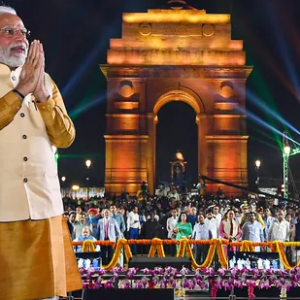After the abolition of the pernicious practice of ‘Instant Triple Talaq,’ it is time to focus attention to the introduction of a Uniform Civil Code across the country. In India, the issue of uniform civil code is oft debated in the context of prevailing religious pluralism and secularism, but is there a logical correlation amongst these three. Secularism, in the sense of respect for all religions, is a logical corollary of religious pluralism. It is a socio-political approach to religious pluralism. Now the question is whether the need for uniform civil code is also not socio-political and why it should not be shorn of all religious considerations. Based on the distinction between the sacred and the temporal can we not confine it to temporal sphere only and do not allow religious consideration to overshadow it? Do national unity and social solidarity not demand uniform civil code? Religion is a matter of personal belief but uniform civil code is an interpersonal matter. Should the two not be separated? These and such other concerns need to be discussed in the contemporary debate.
Secularism and Uniform Civil Code
Secularism and uniform legal code are the hallmarks and requirements of a civilised and developed society. Though initially religion evolved as a human response to the ‘transcendental’, it has come to involve both the sacred and non-sacred life of human being. But in an ideal situation, role of religion should be restricted only to the sacred. The immanent worldly life is distinct though not separate from the religious life. The nature, mode of living and goal of the two are different; in a pluralistic society they must neither be mixed nor conflated. An absence of this requirement results in complicated problems which need to be thrashed out for integrated and peaceful living. A meaningful solution to these problems, which is agreeable to all concerned, requires conceptual clarity and logical analysis of the issues involved so as to draw out their clear-cut distinctions and interrelations. This is particularly so in case of a uniform legal code to regulate the mundane life of all citizens of a country. This is not a matter of feeling or sentiment but of understanding the realities of life in a given situation. It is not an imposition of some pattern of living on an unwilling section of the society but a rational acceptance of the need and utility of uniformity of laws in some spheres of life.
The problems involved here are essentially sociological but they acquire religious and political overtones by viewing them in the background of religion and politics. They pertain to the way of life of a particular society which is religiously pluralistic and in which different sections follow different sets of beliefs and practices traditionally handed down and claimed to be sanctioned by religion. But the problems are not at all religious and religion has nothing to do with civil life in a secular set up. In a theocratic society, civil life is bound with and is governed by a particular religion but that is not the case with a secular society. Whatever be the meaning of secularism, be it state’s indifference to all religions or equi-distance to all religions or equal regard for all religions (and here again a distinction can be drawn between Sarva Dharma Samabhava and Sarva Dharma Sadbhava[1] the spheres of religious life and civil life need to be clearly demarcated. The human life is an organic whole and therefore, one sphere of life cannot be separated from another, but this does not mean that they cannot be distinguished and treated separately and differently. It is just like an organism consisting of multiple organs that are inseparable in a holistic and integral living but each organ can be looked at separately physiologically and treated separately medically for cure of ailments. The concepts of ‘separability’ and ‘distinguishability’ follow different sets of logic and they need not be confused in a scientific thinking.
These problems get further complicated when a distinction is drawn between majority and minority sections of a community on religious grounds. In fact, in a secular set up, such a distinction is illogical and irrational since the very connotation of the term ‘secular’ is antithetical to such a distinction. But in practical life we often care little for logic and reason, particularly when vested interests get entrenched. In a democracy, where people are less educated and where vote-bank politics is rampant, these problems take political colouring. Purely sociological problems are posed as deeply religious. In a society where no distinction is drawn between religious education and education about religion, the so-called protectors of religion acquire an upper hand to exploit religiosity of the masses and lead them to believe that these problems are intimately related with their religious life. The political leaders take shelter of these ‘protectors of religion’ for their own political mileage. It must be made clear that no satisfactory solution can be arrived at if these problems are approached from the ill-founded religious or political considerations because these are not only irrelevant but they bring in extraneous considerations also. If these considerations are allowed to play their nefarious role, they will not only cloud the real issues but will also generate ill will among the sections of the society, endangering peace and harmony.
Need for a Uniform Civil Code
A true religion is never dogmatic and obscurantist and it cannot be so, but some so-called protagonists of a religion are so and therefore they will never permit solution or dissolution of any such problems, since there lingering on is helpful to their self-aggrandisement. Inter-faith dialogues and means like this are of no avail firstly because these problems are not genuinely religious and secondly because those who get involved in these may not have an open and positive mind. A political approach is also bound to fail because the party in power and the party or parties aspiring to come to power have to care for the support of the concerned sections to get votes. It is not helpful to resort to referendum to ascertain the views of different sections because there will be no unanimity. It is misleading to talk of mass approval or disapproval through referendum to ascertain the views of different sections because such a process is generally vitiated by the opinion of a handful of vocal people who may influence the minds of the masses. It may happen that the masses care little to express themselves or they may be incapable of doing so because of lack of knowledge and true information and they may be carried away by a few influential people who may claim to be their leaders. These handful people, quantitatively very insignificant, pose to be elite and their views are passed on as majority opinion. To be influential is one thing and to be scientific is an altogether different thing. Only a scientific mind can have dispassionate and objective temper and may approach issues logically without taking sides. Through proper education, that solution can be made known and disseminated among the concerned people. Of course, what is stated above is theoretical and its actual implementation is not easy, but it is not impracticable either. Given a will, there can be a way.
Against this background we have to view the problem of Uniform Civil Code in the democratic and secular Republic of India. The problem has been lingering on since independence. The judiciary has voiced concern about it. It has pointed out anomalies in the provisions of our Constitution, which the Indian Parliament has to rectify. Indian lawmakers cannot escape their duty on the specious grounds that the Supreme Court has only given a suggestion or advice and not a ‘directive’. The argument also cannot be used that pending amicable agreement, any such enactment may lead to more fragmentations. These are all excuses which vested interests will put forth to further their own agenda. If the Constitution can be amended by inserting the notion of ‘Secularism’ why should its necessary corollary of ‘Uniform Civil Code’ be not incorporated? Simply put, if the demand has come from one section of the community and is opposed by another section, this does not diminish the need and desirability of Uniform Civil Code.
The issue of Uniform Civil Code has to be approached scientifically and in a broader national perspective, but unfortunately, we have not done so. We have not only failed to discern that it is a sociological problem and not religious or political, we have also failed to make a subtle but very vital distinction between change in ‘Muslim Personal Law’ and enacting a ‘Uniform Civil Code’. Logically, these two are not the same. A sociological issue has to be viewed taking it out from its religious, rather sectarian, and political confinements. If this is done, not only will the controversy wither away, there will also be dissolution of the problem. It has to be understood that the scope and canvas of Uniform Civil Code is much wider than the scope and canvas of Muslim Personal Law.
The Muslim Personal Law has been taken up for consideration here because the need for Uniform Civil Code has primarily and initially arisen in the context of the Muslim section of Indian community and the support and opposition to it has come from some vocal elements of the community. But it will hold good for other sections also. The advice of the Supreme Court first came in famous Shah Bano case. But this should not be misunderstood as isolating and singling out Muslim section of our community. One can as well take the example of any other section. This point needs to be emphasised because otherwise there is a danger of its being misunderstood as anti-Muslim.
Islam is a religion adhered to in India and outside. “Muslims in India” is a sociological entity. Some enlightened Muslims have realised and appreciated this distinction. Islam is the same all over, whether practiced in India or elsewhere, but “Muslims in India” does not mean ‘Muslims outside India’. The two are not to be equated. The expression ‘Indian Muslim’ is meaningfully and legitimately used to distinguish Muslims outside India and this is acceptable to all. We can profitably make use of this distinction in approaching this problem. Anything concerning Islam is religious but anything concerning ‘Indian Muslim’ is not necessarily so. Indian Muslims do have facets other than religious. It has been unfortunate that we have very often overlooked this distinction. The same thing has happened with Urdu language which is identified with Muslims though it has been a language or mother tongue of many non-Muslims as well.
Change in Muslim Personal Law and enactment of Uniform Civil Code are not one and the same because there can be change in the former without affecting the latter though not vice versa. Muslim Personal Law touches only one section of the Indian community whereas enacting Uniform Civil Code affects all sections of society. There are many sections and sub-sections in Indian community based on religion or sectarian tenets. Had there been only two sections, say Hindu and Muslim, even then, the two phrases would not have been synonymous because uniformity would have demanded transcendence from both the sections as no Code of anyone could be regarded as standard. The reality is that we have a multiplicity of social groups not based on religion alone and one has to take cognisance of all of them. Since it is a social issue, social groups and not religious groups should be the basis of our consideration.
When some Muslim men and women asked for a change in Muslim Personal Law they had limited objective of bettering the lot of Muslim women. The need for Uniform Civil Code has altogether different considerations. It cannot be argued that even though desirable it is not possible because the Muslim Personal law is based on ‘Shariyata’ which incorporates divine injunctions unchangeable by human beings. Firstly, this argument is irrelevant because it obliterates the distinction between the sacred and the secular. Secondly it is untenable because it is based on the confusion between changing the ‘Shariyata’ and changing an inadequate interpretation of ‘Shariyata’. Change in Muslim Personal Law only calls for change in an inadequate interpretation of ‘Shariyata’. The traditional interpretation is inadequate and outdated. Many Islamic countries have modified it though some retrograde minds have strived for its ‘Talibanisation’. The progressive minds do not approve this Talibanisation. This apart, every divine injunction is meant for human beings and it is to be interpreted by a human being. This is done in accordance with an individual’s noetic or intellectual capacity. Corresponding to the advancement in knowledge, there is also a change in the noetic capacity of the human being that calls for a change in the interpretation. History of humankind has witnessed such a change from time to time as also resistance to such change. This is the law of nature. If, with the advancement in knowledge, no change is instituted in the interpretation, there will be no correspondence between knowledge and reality, theory and practice and this will surely retard the growth of society. The backwardness of Muslim women is a testimony to this. Let it be made clear that whatever is stated about Muslim women is equally applicable to some other sections of the Indian community.
Even if it is argued that a change in Muslim Personal Law involves a change in the ‘Shariyata’ there should be no objection to it if the change is desirable. In this world, God has permitted change. Change is the law of life. It is the basis of cosmic development. Evolutionary thinkers like Darwin have argued that if we do not keep pace with change, in the absence of adjustment with the environment we shall not survive in the struggle for existence and the consequence will be total extinction. Whether Darwinianism is true or not, the point relevant to our analysis is that good change is not something derogatory or condemnable or uncalled for and even God is not averse to it because He has created a changing universe. If it is so, why to create unnecessary fuss about unchangeability of divine injunctions. Further, every law is enacted in accordance with the needs of the time, place and circumstances and a change in them calls for and admits a change in the law. The ‘Shariyata’ is based on the circumstances prevalent in the Arab world centuries before. Now the circumstances have radically changed and therefore, there is no justification for its continuous rigid adherence. Any resistance to it is sheer obscurantism.
Confusing the change in Muslim Law with Uniform Civil Code, it has been argued that this will result in losing of identity by the Muslims in India. It is a bad argument. It should be asked whether continuance of this harmful and outdated law is the only means or the real means of to preserve identity. This smells of narrow-minded sectarian approach. If we approach it as Indians, all such talk will appear meaningless. If we consider national unity and solidarity as desirable ideals, and there can be no two opinions about this, then also it demands a uniform pattern of social and lawful behaviour for the whole nation. Uniform code of social behaviour is not the only means of national unity and solidarity but surely it is one of the most important and essential means.
Religion is primarily a personal matter though it does have social dimension. But in a civilised and advanced society, it should not be allowed to cloud social concerns. There should be meaningful separation between the two. This is particularly so in a secular state. Law has to distance itself from religion.
The need for Uniform Civil Code has a humanitarian aspect as well. There is no denying of the fact that the place and position of women in our society is far from satisfactory, if not pitiable. On the one hand we put forth equality, liberty, fraternity and all other egalitarian ideals as the objective of our social existence, on the other hand we have been continuing with unjust practices, maltreatment and deprivation of women. The preamble of our Constitution enshrines these cherished ideals but they should not remain merely decorative.
Conclusion
In conclusion, it must be reiterated that whatever is said about the Muslim Law holds good about Hindu, Christian, Parsi and other sections and groups in India as well. There are many harmful customs of the tribal communities which need to be brought within this purview. For this enterprise, though noble and desirable, mutual trust is needed and this can be cultivated by proper education which is the sole remedy of our country’s ills and evils.
Author Brief Bio: Prof. S. R. Bhatt is Chairman, Indian Philosophy Congress; Chairman, Asian-African Philosophy Congress; National Fellow, Indian Council of Social Science Research, Government of India Former Chairman, Indian Council of Philosophical Research, and Former Professor & Head, Department of Philosophy, University of Delhi.
References:
[1] Sarva Dharma Samabhava is often translated as “All religions are the same” or “All path’s lead to the same destination (In a religious sense)”, although its literal meaning is closer to “All dharma/faiths are possible”. The term ‘Sarva Dharma Samabhava’ means literally equal respect for all religions.



